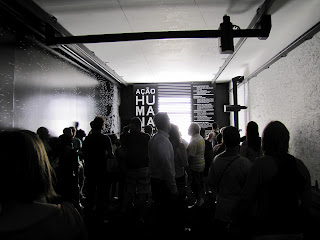Last Wednesday evening, I visited the monumental Humanidades 2012 multi-media exhibit constructed on the Copacabana Fort as part of the parallel events and cultural programming of the Rio+20 conference. Under the direction of the artist, theater director and set designer, Bia Lessa, the exhibit includes a number of interconnected, temporary gallery spaces dedicated to concepts, questions, and areas of debate and reflection under the fluid and expansive signs of development and sustainability. It opened to the public on June 11 and is expected to remain through the 22nd. There are a total of 16 gallery spaces in the roughly 6 story temporary structure build from scaffolding and a recycled composite material. On this visit I had time to see just the first four galleries:
"Reception / Free Territory"
Including a temporary garden with species of plants representing Brazilian biomes, text from Padre Antonio Vieira's "Saint Anthony's Sermon to the Fishes", and information on Brazil's Atlantic and Amazon forests.
"The World We Live In"
Curated by the Museu do Futuro, this room intends to represent the advent of the Anthropocene age, illustrating the advent, development, and scale of human activity on the planet.
"The World Divided"
Taking a quote from Brazilian economist Celso Furtado as its starting point, this room intends to draw the connection between environmental degradation and socio-economic inequality, or between redistributive justice and environmental sustainability.
(Can't get this one to post vertically) Translation: If we've changed everything about us, there's one thing we forgot to change: our selfish attitude towards life. And that's what was most important! -- Mario de Andrade
Translation: The challenge we face at the turn of the 21st century is nothing less than the reinvention of civilization, dislodging its axis from the logic of means for short-term accumulation toward the logic of ends: general well-being, the exercise of freedom, and cooperation among peoples. -- Celso Furtado
"Chapel / Space for Humankind"
Described as the center of the installation, a space dedicated to the human potential for the generation and transmission of knowledge and imagination through our capacity for language. A provisional library and reading room filled with books selected by 120 Brazilian public figures -- writers, artists, scientists -- as fundamental to their affective and intellectual development and as contributions to a universal notion of humanity.














No comments:
Post a Comment